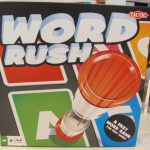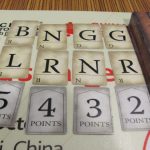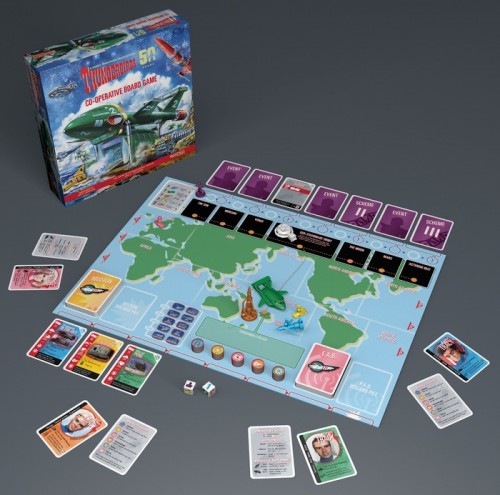Decks and Decks of Cards with Letters
28 Feb
Posted by Thomas Deeny as Card Games, Modern Board Games
 At Toy Fair, we stopped by Set Enterprises (maker of Set, Five Crowns, and Quiddler) to look at their new game, WordSpiel. WordSpiel, like Quiddler, consists of a large deck of cards — 110 of them — with each card featuring a letter. Unlike Quiddler, the game also comes with a sixty-second timer.
At Toy Fair, we stopped by Set Enterprises (maker of Set, Five Crowns, and Quiddler) to look at their new game, WordSpiel. WordSpiel, like Quiddler, consists of a large deck of cards — 110 of them — with each card featuring a letter. Unlike Quiddler, the game also comes with a sixty-second timer.
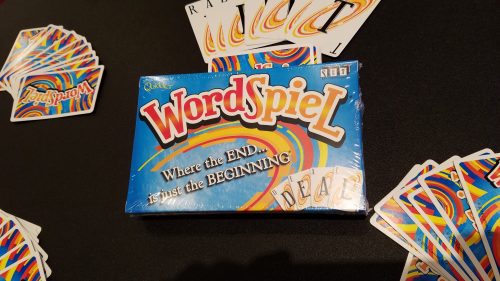
Here’s how it goes: we start with one letter card face-up. Each player gets ten letter cards and on their sixty-second turn, they play a word starting with the last letter(s) shown. So if the ever-growing spiral of cards reads STEP, the next player could play R, I, E, S, T for the word “priest”, and the lineup now looks like STEPRIEST. Then the next player could play R, A, N, D for the word “strand” using the ST at the end the spiral, and we’ve got STEPRIESTRAND.
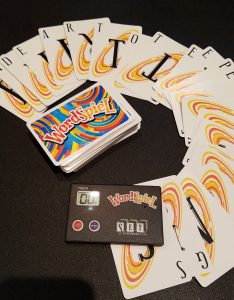 When it’s not your turn, you can discard up to three cards from your hand, drawing replacements. If the timer goes off — there’s a ten second warning beep — the player has to draw a card and either place it at the end of the spiral or add it to your hand. Get rid of your cards and you win, everyone else gets as many points as they have cards left in their hand.
When it’s not your turn, you can discard up to three cards from your hand, drawing replacements. If the timer goes off — there’s a ten second warning beep — the player has to draw a card and either place it at the end of the spiral or add it to your hand. Get rid of your cards and you win, everyone else gets as many points as they have cards left in their hand.
We played a three-player game and either were able to play cards right away or we realized we had nothing to play, also right away. We never went below forty seconds on the timer — even the ten year old didn’t — and we did have to adjust our hands a bit to find those elusive letter combinations to make something fit. But we never really needed the timer.
Overall a fun, quick game. The rules say the winner is the player with the lowest total score after five rounds, but three rounds was enough for us. I would recommend playing as many rounds as there are people playing.
WordSpiel was released in the past few days, so your store should have it now or shortly. It retails for $13.
Now, it’s my thought that a game deck featuring letters instead of numbers or pips needed something aside from just the rules one uses with the deck to make a game. For instance, there were four other new or re-issued games at Toy Fair we saw that used the same basics: a deck with letter cards. And there was also Quiddler at the same booth.
Playroom Entertainment’s Unspeakable Words also comes with little Cthulhu pawns. It’s one of many “make words with these letter” games, but this game has scoring based on the number of angles in the letter instead of rarity, and allows you to make up words with random letters if you go insane. A re-issue of the game in slightly different box is expected in May at a $25 retail price. Unspeakable Words has 96 letter cards.
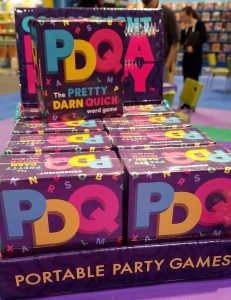 PDQ from Gamewright is another re-issue, having been out of print for five years. The game finds itself as part of the small box Port-A-Party line (all games in this line are $10 retail) as just a box of 78 letter cards. Throw three cards down and try to make a word out of them either left-to-right or right-to-left. The letters N K B come out. Did you shout out “unknowable” before someone else called out “broken”? Then you grab those three cards and keep them as points. PDQ will be available in March.
PDQ from Gamewright is another re-issue, having been out of print for five years. The game finds itself as part of the small box Port-A-Party line (all games in this line are $10 retail) as just a box of 78 letter cards. Throw three cards down and try to make a word out of them either left-to-right or right-to-left. The letters N K B come out. Did you shout out “unknowable” before someone else called out “broken”? Then you grab those three cards and keep them as points. PDQ will be available in March.
(We wound up playing PDQ with our WordSpiel deck. The girl took the deck to school for after-class game club on Monday and just wound up playing PDQ with it, over and over.)
Tactic Games USA is bringing out Word Rush in June for just $20. Draw one of the fifty topic cards and name a word in that topic that begins with one of the nine letter cards shown. (100 letter cards in Word Rush.) Flip a sand timer and put it on the letter used. Now the next player has to name something that fits the topic starting with one of the eight other letters before the sand timer runs out. If they do, they flip and move the sand timer. So there’s some strategy in how you use the time available in addition to just naming words.
- Word Rush
- Word Rush
- Wordsy
Or maybe you’d like Wordsy from Formal Ferret Games? That’s a reimplementation of Prolix by the same developer, but now uses 60 letter cards instead of chips. In Wordsy, you lay out eight letter cards in two rows, with each column of two cards assigned a point value from 2 to 5. Everyone searches for a single word that uses a lot of the letters shown; the first one to commit a word flips the sand timer, gaining a point to do so. And then, scoring. For the letters in the above photo, the word LEARNING would earn 19 points while the word GARBAGE would earn just 10. Wordsy will be out in June for $20.
You know, that looks like fun. We might give that a play with our WordSpiel deck.
A copy of WordSpiel was provided free for review by Set Enterprises.
- Comments Off on Decks and Decks of Cards with Letters
Crowdfunding Highlights
16 Sep
Posted by David Miller as Card Games, Classic Board Games, Modern Board Games, RPGs
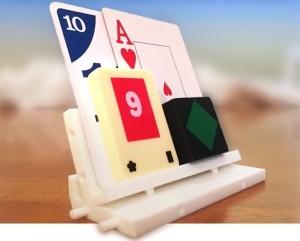 UberStax is a universal game accessory that can be used as a holder for cards, tiles, tokens and other game components. Its racks and supporting elements fit together in extra-wide, multi-level, or other configurations as appropriate to the game or desired by the user. UberStax are meant not just as a convenience for the general gamer but also as a support for those with manual dexterity issues.
UberStax is a universal game accessory that can be used as a holder for cards, tiles, tokens and other game components. Its racks and supporting elements fit together in extra-wide, multi-level, or other configurations as appropriate to the game or desired by the user. UberStax are meant not just as a convenience for the general gamer but also as a support for those with manual dexterity issues.
Hawke Robinson is a registered recreational therapist who’s run both adapted and non-adapted roleplaying games for people with Autism, Cerebral Palsy, and a variety of special needs, as well as for at-risk children. So far, he’s been limited to providing these therapeutic services—which he does without charge—to the area of Spokane, Washington. He’d like, however, to take his game on the road and so is turning to the public for help with funding a wheelchair-friendly RPG trailer—basically a game room on wheels.
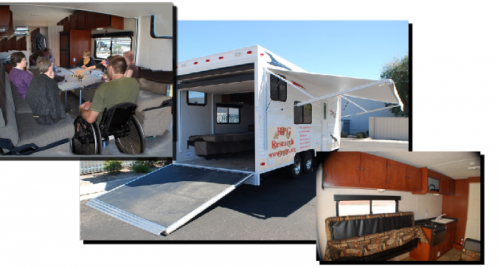
The Networks is a card-drafting game where the goal of players is to assemble the best lineup of television shows and attract the most viewers. Shows, stars, time slots, genres, demographics, and advertisers all must be managed and considered. The shows themselves even age over time, forcing players to continually develop new shows to keep viewers tuning in. Despite these various elements, The Networks is supposed to be a light-to-moderate game with a healthy dose of satirical humor.
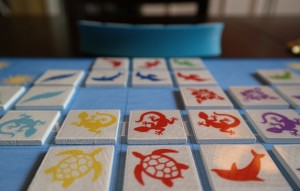 Latice is beautiful and its gameplay simple. Place a tile adjacent to another tile with which it shares a color or shape. Place it next to two or more tiles with shared color or shape to earn special moves such as repositioning an already placed tile.
Latice is beautiful and its gameplay simple. Place a tile adjacent to another tile with which it shares a color or shape. Place it next to two or more tiles with shared color or shape to earn special moves such as repositioning an already placed tile.
A Hindu board game out of Croatia, Catch Krishna in Vrindavan aims to encapsulate the Bhakti devotion. One player takes on the role of Krishna, the others become the gopis chasing him around a map of the ancient city.
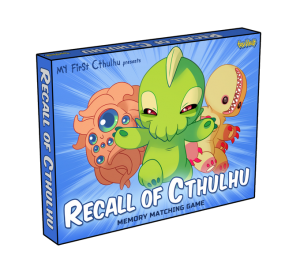 Under a banner of “cultists have kids too,” Toy Vault is seeking funds for Recall of Cthulhu, a Lovecraftian memory-matching game. The basic game is straightforward—turn over two matching tiles—but the advanced game adds a layer of moderate complexity. For example, some tiles are worth more than others, matching is no longer 1-to-1, and certain tiles trigger special actions, like a bonus turn-over.
Under a banner of “cultists have kids too,” Toy Vault is seeking funds for Recall of Cthulhu, a Lovecraftian memory-matching game. The basic game is straightforward—turn over two matching tiles—but the advanced game adds a layer of moderate complexity. For example, some tiles are worth more than others, matching is no longer 1-to-1, and certain tiles trigger special actions, like a bonus turn-over.
- Comments Off on Crowdfunding Highlights
Crowdfunding Highlights
09 Mar
Posted by David Miller as Miniatures, Modern Board Games, RPGs, War Games
The latest nostalgic trigger overfunding on Kickstarter is the Thunderbirds Co-operative Board Game from Modiphius Entertainment. Designed by Matt Leacock of Pandemic fame, the game has players taking on the roles of the individual Tracy family members, completing various rescue missions around the world, and most importantly, piloting miniatures of the beloved Thunderbirds vehicles. The project is currently working toward a stretch goal that would allow a fifth player to act as the evil Hood.
If for no other reason, I would have had to mention Bad Medicine for best integration of a gorilla suit in a project video. Fortunately, though, this party game that bucks the recent trend of simply being crude has more to offer than that. In Bad Medicine players identify maladies, concoct remedies, and argue over side effects. Sounds like a visit with the grandparents.
RPE Miniatures’ Phroggs project is for 28mm metal figures of science-fiction amphibians. They’ll be produced in Poison Dart Frog, Fire Bellied Toad, and Bullfrog versions, each with futuristic uniforms and weapons.
Another minis project is the one for cast resin terrain by THMiniatures. It features unpainted elements in two groups: fortifications and ruins.
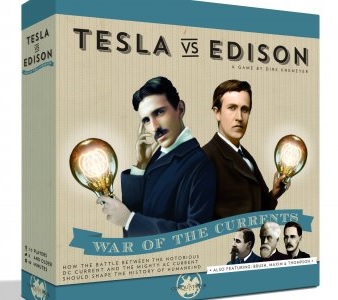 I’m a very geeky geek. Besides the obvious focus on games, I have a real fascination with the history of electric utilities (it’s the engineering background, I guess). So Artana’s project for a board game on just that subject hooked me on two fronts. Tesla vs. Edison has the PR antics, stock shenanigans, and business chicanery that was a real part of the industry in its early days. My only beef (without having played the game yet) is Artana’s assumption that all geeks will side with Tesla. You can count me in the Edison camp.
I’m a very geeky geek. Besides the obvious focus on games, I have a real fascination with the history of electric utilities (it’s the engineering background, I guess). So Artana’s project for a board game on just that subject hooked me on two fronts. Tesla vs. Edison has the PR antics, stock shenanigans, and business chicanery that was a real part of the industry in its early days. My only beef (without having played the game yet) is Artana’s assumption that all geeks will side with Tesla. You can count me in the Edison camp.
Nova Aetas is a tactical combat board game set in Renaissance Italy. Nova Aetas can be played single-player, cooperative, or competitive and includes 50 miniatures, 3D terrain, and a campaign of 30 scenarios. It also promises tough enemies controlled by an aggressive AI and a time-based action management system.
- Comments Off on Crowdfunding Highlights
Trending
- Massdrop.com
- Oh the Irony—Illuminati Card Game Continues to Inspire Conspiracy Theorists
- Home
- Footprints, an Educational Ecology Game
- USPS Adds Board Game Flat Rate Box
- Baila, the Estonian Drinking Card Game
- Crystal Caste Wins Dice Patent Suit Against Hasbro
- Mirror Game, Red and Blue
- Are Board Games Dangerous?
- The Truth About Dominoes On Sunday in Alabama
Archives
Most Popular Articles
- Oh the Irony—Illuminati Card Game Continues to Inspire Conspiracy Theorists
- The 20 Most Valuable Vintage Board Games
- The Truth About Dominoes On Sunday in Alabama
- Sequence Game, and Variants
- USPS Adds Board Game Flat Rate Box
- Baila, the Estonian Drinking Card Game
- The 13 Most Popular Dice Games
- Are Board Games Dangerous?
- Guess Who? The Naked Version
- What Happened to the Jewel Royale Chess Set?
Recent Posts
- Toy Fair 2019—Breaking Games
- Talisman Kingdom Hearts Edition
- Toy Fair 2019—Winning Moves
- Toy Fair 2019—Games Workshop
- Toy Fair 2019—Star Wars Lightsaber Academy
- Toy Fair 2019—Stranger Things Games
- Toy Fair 2019—HABA
- Licensing Roundup
- Game Bandit
- 2018 A Difficult Year For Hasbro But Not For D&D Or MtG
Recent Comments
- on Toy Fair 2019—Winning Moves
- on Game Bandit
- on Second Look—Dungeons & Dragons Waterdeep Dragon Heist
- on Crowdfunding Highlights
- on Beyblade SlingShock
- on Game Bandit
- on Game Bandit
- on Watch This Game!, the Board Game Review Board Game
- on Second Look—Vampire: The Masquerade 5th Edition
- on Palladium Books Loses Robotech IP License, Cancels Five-Year-Overdue Robotech RPG Tactics Kickstarter

